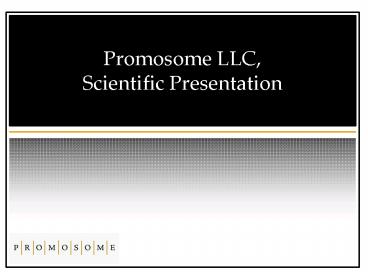Promosome LLC, - PowerPoint PPT Presentation
1 / 18
Title:
Promosome LLC,
Description:
Ribosomal recruitment can occur at m7G cap or internal ribosome entry site (IRES) ... by exposing individuals to DNA constructs expressing immunogenic antigens ... – PowerPoint PPT presentation
Number of Views:53
Avg rating:3.0/5.0
Title: Promosome LLC,
1
Promosome LLC, Scientific Presentation
2
Gene expression leading to protein production
3
Translation begins with recruitment of the 40S
ribosomal subunit
- Ribosomal recruitment can occur at m7G cap or
internal ribosome entry site (IRES) - Some IRESes are composed of shorter functional
elements
4
Translational Enhancement Elements - TEEs
- Most IRESes facilitate very low levels of
translation initiation - when compared to the cap-structure
- However, Promosomes scientists discovered that
some IRES- - elements drive very high levels of
translation when linked together - in some cases much higher than the
cap-structure alone! - Promosomes scientists coined the term
Translational Enhancer - Element (TEE) for sequence elements that
can enhance translation - above the level of the cap-structure
- whether or not they
function as IRESes
5
Synthetic TEEs can dramatically boost protein
synthesis
6
TEEs can be selected from libraries of random
sequences
- In earlier work, Promosomes scientists
developed 2 selection methods to identify
IRES-modules in mammalian cells and yeast - However, most of these IRES-modules were
inefficient in Chinese Hamster Ovary (CHO) cells - Also, most of these IRES-modules did not function
as TEEs - To identify TEEs that enhance translation in CHO
cells, Promosome developed an efficient positive
feedback selection method which avoided problems
of earlier methods
7
Development of Synthetic TEEs
- Positive feedback vector system has been used to
identify - 68 mRNA-elements that function in CHO
cells - 59 of these elements enhanced protein production
when tested - as 5 linked copies in the 5 leader of
a reporter mRNA
8
Activities of synthetic enhancers with 5
copies of individual TEEs in CHO cells
Control
9
Activities of synthetic enhancers with multiple
TEEs in CHO cells
10
Proof of Concept Study with EMD Lexigen
Pharmaceuticals
- Lexigen is a company involved in the production
of protein- based drugs - - developed fusion proteins to facilitate
protein production purification - Promosomes challenge
- - increase production of an
Interleukin-2 fusion protein by - 2-fold in Baby Hamster Kidney (BHK)
cells - Promosome tested its synthetic enhancers which
functioned - in CHO cells and identified several that
also enhanced protein - production in BHK cells
11
Production of Fc-Il2 fusion protein in BHK cells
Control 1 Control 2
12
Development of vector systems to overexpress
monoclonal antibodies in CHO cells
- Monoclonal antibodies account for
approximately 20 of therapeutic products in
development - - it is forecast that they will become an
- even more dominant sector of the
- therapeutic protein market by 2008
- A recent survey identified 480 companies with
monoclonal antibody programs
13
Production of the IgG light chain in CHO cells
Control
14
Production of the IgG heavy chain in CHO cells
15
Enhanced production of an antibody heavy chain
when co-expressed with a light chain
16
Enhanced production of recombinant antibody
when both chains co-expressed from one plasmid
Studies expressing the light heavy chains from
two plasmids or a single plasmid have identified
combinations of TEEs that can increase production
of recombinant antibody from approximately 4 to
10-fold
17
Applying Promosomes technology to DNA vaccines
- DNA vaccines
- - attempt to develop immunity by exposing
individuals to DNA constructs expressing
immunogenic antigens - Limitation insufficient therapeutic
response - - appears to be due to insufficient antigen
production - Promosomes solution
- - the development of synthetic translational
enhancers that function in the appropriate cell
types
18
Scientific Summary
- Synthetic Translation Enhancement Elements
(TEEs) - Increase protein synthesis
- Multiple TEEs work together to facilitate
even higher levels - of protein synthesis
- Positive feedback and selection platforms
provide basis - for identifying elements for other cell
types































